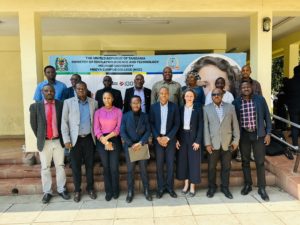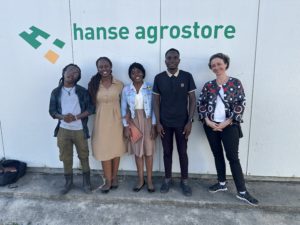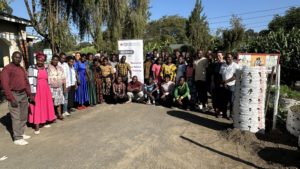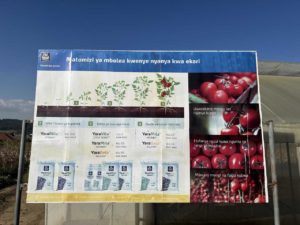In kicking off the fieldwork research, IDOS director Prof. Anna-Katharina Hornidge emphasised that international cooperation is critical to achieving sustainable futures. She also highlighted that multiple crises such as crisis of trust, climate change, social polarisation and authoritarianism undermine global peace and stability.
The Science Futures team led by Co-Principal Investigators Prof. Anna-Katharina Hornidge and Dr Michael Brüntrup kicked off the fieldwork research for the Collaborative Research Centre (CRC/TR228) in Tanzania on 4 June at Mzumbe University in Mbeya, southern Tanzania. In kicking off the fieldwork research on knowledge systems and spatial planning in the Southern Agricultural Corridor of Tanzania (SAGCOT), Hornidge held a keynote address at a public lecture at Mzumbe University, Kwame Nkrumah Hall, under the title “International Cooperation in times of Global Disorder”. More than 400 participants attended the presentation.

Part of these attendees was the Principal of Mzumbe University Mbeya Campus, Prof. Henry Abraham Mollel, Regional Commission high-level official, Said Juma Maditto, as well as the Tanzania Agricultural Research Institute Coordinator for Research and Innovation. Academics and students from the University of Dar es Salaam and the Mbeya University of Science and Technology were also present. Representatives of media houses as well as civil society organisations, such as Mbozi, Illeje, Isangati Consortium (MIICO), Gender Integrated Climate Resilient Agricultural Technologies (GICA- Technologies) and the Kuhn- SAFA Project Team, attended the event.
Hornidge pointed out the importance of international cooperation in designing and implementing sustainable futures. As such, it is critical to build trust and reciprocal cooperation across states. Only this way a sustainable future is achievable. She also discussed the key aspects of the Science Futures Project, which looks at spatial planning and agricultural knowledge systems that shape the internal dynamics and contestations of the corridor (SAGCOT). Questions from attendees included how to achieve international cooperation in a world characterised by increasing polarisation and what are the prospects of achieving international cooperation without undermining national sovereignty.

After the public lecture, between 4 and 10 June, Anna-Katharina Hornidge then led the team into the field, constituted by IDOS researchers Ngoni Kativu and Dr George Mudimu, Dr Adrian Barongo from Mzumbe University as well as Glory Mella and Diana Clemens from Sokoine University. The team made field visits to smallholder farmers in Uyole and Rungwe. The smallholder farmers are involved in tomatoes, avocados, maize, beans, coffee and banana cultivation and processing at a localised level. The farmers include men, women and the youth. In addition, the team visited civil society organisations, such as SAGCOT Mbarali Cluster and Partnership Support, TARI, and MIICO, involved with the corridor. The team also toured the YARA funded agriculture knowledge hub at Mbeya University of Science and Technology.

During this preliminary fieldwork phase, the team was engaged in intense interviews and knowledge exchange with the farmers and organisations. The team also attended a workshop jointly hosted by the civil society organisation, MIICO, and IDOS researcher, Ngoni Kativu. This workshop focussed on how farmers envisioned their future and how they understood the processes of spatial planning in the corridor. A further workshop was organised as part of the kick-off. Entitled „farmers’ future making“, around forty participants took part in it. They found the workshop very innovative, arguing that it involved the use of Lego toys as instruments of learning and knowledge exchange.

Moreover, Michael Brüntrup engaged in High Level discussions with SAGCOT officials in Dar es Salaam and Morogoro on understanding the agriculture and spatial planning dynamics on the corridor. The Science Futures team will be in the field until mid-August this year, engaging more with farmers and stakeholders in the Mbarali Cluster of SAGCOT, and will share more insights as the fieldwork unravels. The team is hugely indebted to their local partner Mzumbe University Morogoro and Mzumbe Campuses for their unwavering support and guidance in the fieldwork.

Schreibe einen Kommentar